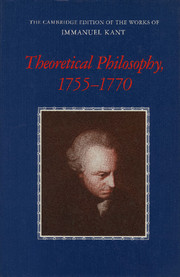Book contents
- Frontmatter
- Contents
- General editors' preface
- Preface
- Guide to abbreviations
- General introduction
- Introductions to the translations
- Résumés of the works
- A NEW ELUCIDATION OF THE FIRST PRINCIPLES OF METAPHYSICAL COGNITION (1755)
- THE EMPLOYMENT IN NATURAL PHILOSOPHY OF METAPHYSICS COMBINED WITH GEOMETRY, OF WHICH SAMPLE I CONTAINS THE PHYSICAL MONADOLOGY (1756)
- AN ATTEMPT AT SOME REFLECTIONS ON OPTIMISM (1759)
- THE FALSE SUBTLETY OF THE FOUR SYLLOGISTIC FIGURES (1762)
- THE ONLY POSSIBLE ARGUMENT IN SUPPORT OF A DEMONSTRATION OF THE EXISTENCE OF GOD (1763)
- ATTEMPT TO INTRODUCE THE CONCEPT OF NEGATIVE MAGNITUDES INTO PHILOSOPHY (1763)
- INQUIRY CONCERNING THE DISTINCTNESS OF THE PRINCIPLES OF NATURAL THEOLOGY AND MORALITY (1764)
- M. IMMANUEL KANT'S ANNOUNCEMENT OF THE PROGRAMME OF HIS LECTURES FOR THE WINTER SEMESTER 1765 — 1766 (1765)
- DREAMS OF A SPIRIT-SEER ELUCIDATED BY DREAMS OF METAPHYSICS (1766)
- Preamble, which promises very little for the execution of the project
- The first part, which is dogmatic
- The second part, which is historical
- First chapter A story, the truth of which is recommended to the reader's own free examination
- Second chapter Ecstatic journey of an enthusiast through the spirit-world
- Third chapter Practical conclusion drawn from the treatise as a whole
- CONCERNING THE ULTIMATE GROUND OF THE DIFFERENTIATION OF DIRECTIONS IN SPACE (1768)
- ON THE FORM AND PRINCIPLES OF THE SENSIBLE AND THE INTELLIGIBLE WORLD [INAUGURAL DISSERTATION] (1770)
- Factual notes
- Bibliographies of editions and translations
- Glossary
- Biographical-bibliographical sketches of persons mentioned by Kant
- Index
First chapter - A story, the truth of which is recommended to the reader's own free examination
Published online by Cambridge University Press: 18 December 2014
- Frontmatter
- Contents
- General editors' preface
- Preface
- Guide to abbreviations
- General introduction
- Introductions to the translations
- Résumés of the works
- A NEW ELUCIDATION OF THE FIRST PRINCIPLES OF METAPHYSICAL COGNITION (1755)
- THE EMPLOYMENT IN NATURAL PHILOSOPHY OF METAPHYSICS COMBINED WITH GEOMETRY, OF WHICH SAMPLE I CONTAINS THE PHYSICAL MONADOLOGY (1756)
- AN ATTEMPT AT SOME REFLECTIONS ON OPTIMISM (1759)
- THE FALSE SUBTLETY OF THE FOUR SYLLOGISTIC FIGURES (1762)
- THE ONLY POSSIBLE ARGUMENT IN SUPPORT OF A DEMONSTRATION OF THE EXISTENCE OF GOD (1763)
- ATTEMPT TO INTRODUCE THE CONCEPT OF NEGATIVE MAGNITUDES INTO PHILOSOPHY (1763)
- INQUIRY CONCERNING THE DISTINCTNESS OF THE PRINCIPLES OF NATURAL THEOLOGY AND MORALITY (1764)
- M. IMMANUEL KANT'S ANNOUNCEMENT OF THE PROGRAMME OF HIS LECTURES FOR THE WINTER SEMESTER 1765 — 1766 (1765)
- DREAMS OF A SPIRIT-SEER ELUCIDATED BY DREAMS OF METAPHYSICS (1766)
- Preamble, which promises very little for the execution of the project
- The first part, which is dogmatic
- The second part, which is historical
- First chapter A story, the truth of which is recommended to the reader's own free examination
- Second chapter Ecstatic journey of an enthusiast through the spirit-world
- Third chapter Practical conclusion drawn from the treatise as a whole
- CONCERNING THE ULTIMATE GROUND OF THE DIFFERENTIATION OF DIRECTIONS IN SPACE (1768)
- ON THE FORM AND PRINCIPLES OF THE SENSIBLE AND THE INTELLIGIBLE WORLD [INAUGURAL DISSERTATION] (1770)
- Factual notes
- Bibliographies of editions and translations
- Glossary
- Biographical-bibliographical sketches of persons mentioned by Kant
- Index
Summary
Sit mihi fas audita loqui
– VirgilThe arrogance of philosophy causes it to be exposed to all kinds of futile question. And philosophy often finds itself seriously embarrassed when it is confronted by certain stories: it is unable either to doubt some of them with impunity or to believe others without being mocked. In the case of the stories which circulate concerning spirits, the two problems to a certain extent arise together, the former in listening to someone solemnly recount such stories, the latter in recounting them to others. And it is, indeed, the case that there is no reproach more bitter to the philosopher than that of credulity and being duped by popular error. Those who know how to create the impression of cleverness at no great expense pour their scornful laughter on anything which, because it is unintelligible both to the ignorant and to the wise, reduces them both to more or less the same level. It is, therefore, not surprising that phenomena of this kind, which are so frequently alleged to occur, should find wide acceptance, though publicly they are either denied or, indeed, hushed up. One can be sure, therefore, that no academy of sciences will ever make this material the subject of a prize question, not because the members of such academies are wholly free from the tendency to subscribe to the opinion in question, but because the rule of prudence rightly excludes the questions which are indiscriminately thrown up both by prying inquisitiveness and by idle curiosity. And thus it is that stories of this kind are probably only ever believed secretly, whereas publicly they are dismissed with contempt by the incredulity which is currently in fashion.
However, it seems to me that this whole question is neither sufficiently important nor sufficiently prepared for us to be able to arrive at any decision in the matter.
- Type
- Chapter
- Information
- Theoretical Philosophy, 1755–1770 , pp. 340 - 344Publisher: Cambridge University PressPrint publication year: 1992

